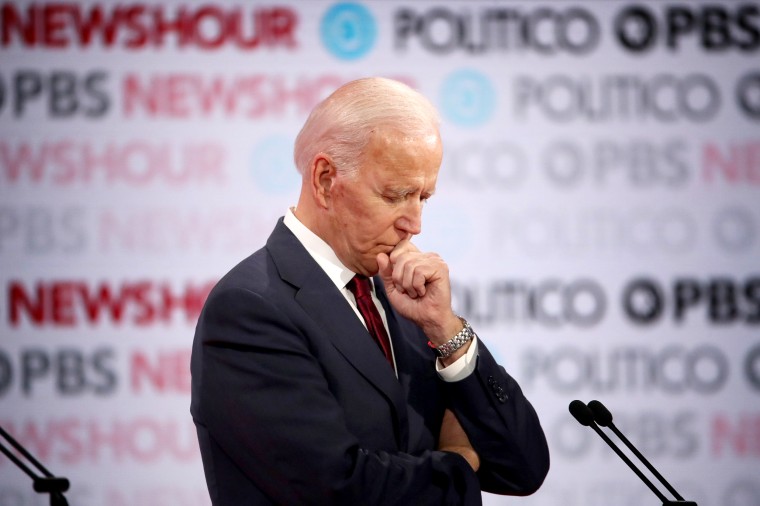When the recording of my radio show was done, my camp counselor dragged the cursor over a wriggling patch of the uploaded sound file that was now displayed on his computer screen and snapped the delete button. Then he dragged it over the next patch ... SNAP. Drag … SNAP.
Suddenly, I realized.
He was editing out my stutter.
The drags and snaps faded behind me as I left the cabin, but in my 10-year-old mind the question rattled: Why’d he do that? I really wanted to ask him, but it was a stupid idea because that meant talking again, and that meant stuttering again, and that had to be avoided at all costs.
After years of avoiding stuttering at all costs, of seeing it as a weakness that needs to be hidden, it seems Biden can’t bring himself to say that he still stutters.
My experience that summer was only one of many sending me the message that I needed to be “fixed,” that I needed to edit the stutter out of my life. So, middle school became a game. Sometimes, I’d magically figure out ways to stuff up my stuttering and win, other times I’d let the secret out. The fear of losing followed me everywhere. Every stutter was a failure that poked holes in my only defense. As a last resort, I talked less and less, erasing myself into silence.
I only learned years later that the real way to win was to openly accept my stutter and refuse to let it hold me back. I can speak more easily if I embrace my speech rather than fight it, and be more at ease with myself. But the stigma associated with stuttering makes that a hard lesson for many of the more than 3 million stutterers in America to absorb. What would help all of us tremendously is if former Vice President Joe Biden, a U.S. leader with a huge reach, used the platform of Tuesday night’s Democratic presidential debate to talk about his own stuttering and the need for greater acceptance.
When Biden addressed the American Institute for Stuttering Gala three years ago, it moved me to tears. Never before had I heard someone so powerfully encapsulate how stuttering “drags you down to that empty hole in your chest. That feeling of panic you get and then anger.” I felt trapped by my stutter, and I found comfort in Biden showing me that I wasn’t alone.
But when Biden finally alluded to his stutter before a national audience, at the last Democratic debate in December, I was conflicted. He mentioned how he encourages children who stutter when he meets them on the campaign trail, and getting the word out about stuttering is a step forward. But there’s a much bigger story to tell, and in not taking the opportunity to tell it, Biden hurts millions of people like me.
The leading Democratic presidential candidate talks about his stutter in the past tense. He says he “overcame” it as a younger adult after adopting a myriad of tricks, the kind taught by speech pathologists at the time, to hide it and speak fluently. Yet Biden still noticeably stutters despite his best efforts; his rhetorical “gaffes” on the campaign trail are sometimes due to swapping out a word he’s about to stutter on, as a recent Atlantic piece described. After years of avoiding stuttering at all costs, of seeing it as a weakness that needs to be hidden, it seems he can’t bring himself to say that he still stutters.
So in reality, Biden is doing the exact opposite of overcoming his stutter. It’s an example that encourages other people who stutter to attempt to “cure” themselves, but that only digs them deeper into avoidance behaviors and fear. The ways he describes quashing his stutter by figuring out how not to stutter only encourages the idea that stuttering needs to be hidden and fuels what’s known as the “stuttering paradox.”

The stuttering paradox is a central concept in the condition of stuttering because by its nature, the more you don’t want to stutter, the more you do. It’s like a Chinese finger trap where the tension between your fingers is the tension between your vocal chords. Hating your stutter and constantly trying to speak fluently stokes a vicious cycle; it makes every stutter feel like a failure that stops you from talking, encouraging you to play the nerve-wracking game of hiding your stutter, all while making you stutter more tensely -- which makes you want to hide it even more.
I spent years locked in by vocal tension. But then, speech therapy at the American Institute for Stuttering taught me how to break the cycle by helping me to stop wanting to hide my stutter. This model, called “cognitive restructuring,” is a new approach to speech therapy. Instead of trying to “fix” stuttering, it aims to help people accept it as part of who they are, refuse to let it hold them back, and decrease the tension of their stutters by counteracting the instinct to feed the stuttering paradox.
Unfortunately, many speech therapists use the “fluency shaping” model of teaching clients to not stutter. This only plays into the stuttering paradox, causing more harm than good. Really, though, ignorance and the social pressure not to stutter are the true culprits of the stuttering paradox. If everyone knew that stuttering wasn’t to be hidden or fixed, then 70 million people wouldn’t be trapped by fear. That’s why Biden could have such a huge impact if he didn’t hide, and if he embraced the cognitive restructuring model.
The cognitive restructuring method compelled me to practice breaking out of silence. I used speech exercises to counteract avoidance behavior, or bad habits I used to button up my stuttering. In school, I forced myself to raise my hand. Staring down the roller coaster drop, I stuttered, reached into my pocket, and clicked a tally counter. I was tracking how many times I stuttered on purpose. I was training my subconscious to believe stuttering was so okay that I’d even choose to do it.
Now, every second I talk, I dig inside my subconscious to root out the hardwired instincts telling me I can’t stutter. It’s exhausting, but I summon the courage not to care if people think I’m broken.
So while I still stutter, I do so with a calm and a confidence that frees me to joke with friends, share my math strategy, order my pizza. And now that I’m not muscling through my stutters, I can stutter onto the next word with more comfort and less tension.
I am who I am today not in spite of stuttering, but thanks to stuttering. Everybody talks about how overcoming their greatest fear builds character — sometimes it’s flying in an airplane or jumping off the high diving board — and I do this hundreds of times a day. Every word is so hard-won that I have to make it mean something. What I have to say is too important to let anything stop me.
This new perspective showed me that stuttering is bigger than just my story. Last year, in 11th grade, I started a project called Hear Me Out to spread the word. So far, I’ve given 18 presentations at my high school. Last summer, I was a keynote speaker at the American Institute for Stuttering Gala myself.
Lately, I’ve been perusing social media groups of people who stutter. I constantly see people in the same state as that ashamed boy in camp -- people who don’t know about the stuttering paradox, people who carry their stutter as a sign of weakness and a barrier to everything they could ever do.
Biden is one of the only people with the public presence necessary to truly shift the world’s view on stuttering, and the therapeutic world’s approach from fluency shaping to cognitive restructuring. Imagine what it would be like if he brought it up during the debate, if he finally “admitted” that he still stutters and explained the value of refusing to hide it, if his message bounced around the media, if the truth about stuttering became common knowledge, if people who stutter no longer had worry what others thought of them, if millions of people looked up to him as the person who changed society’s perception of stuttering and freed them to speak fearlessly.
The reason I’m so passionate about effecting change is because I’m one of the lucky ones. I escaped the shame, fear and pain of trying to hide my stutter, so I have an obligation to help others escape, too. Biden has a tremendous stage Tuesday night he could use to help his fellow stutterers make the same journey as well.
CORRECTION (Jan. 15, 2020, 5 p.m. ET): A previous version of this article misstated the estimated number of Americans who stutter. It is more than 3 million, not around 70 million, according to the Stuttering Foundation. (Seventy million is the foundation's worldwide estimate.)



